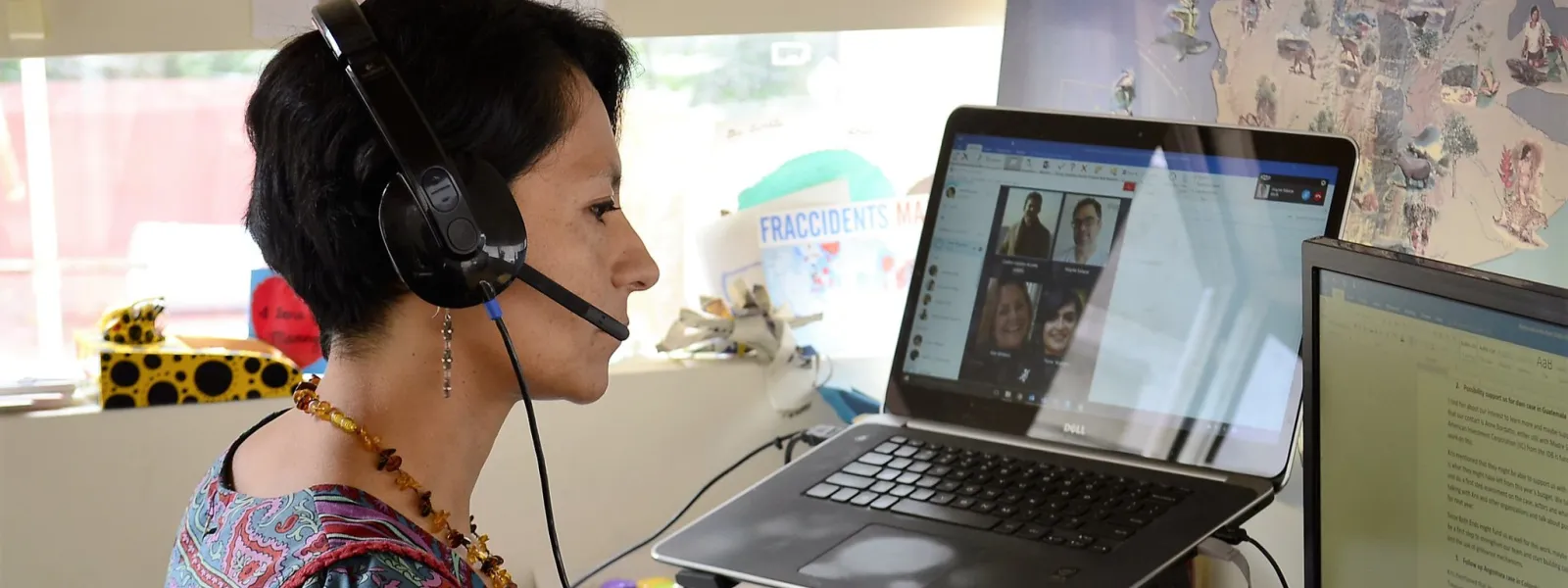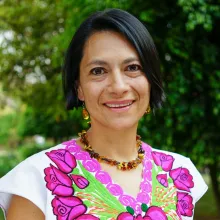
¡Gracias totales!
I’m ending an era of 18 great years at AIDA, my second home. Words are not enough to describe how grateful, proud and happy I feel as I take stock of the achievements, progress and lessons learned. I treasure the wonder of meeting and sharing this journey with so many people in every corner of our Americas and beyond; the blessing of traveling rivers, mountains and territories and learning with and from each and every person and community. For all of this, I can only say: ¡Gracias totales!
This has been the work of my dreams and the great honor of my life: to be able to build and lead this organization, alongside great people, building community from our female leadership, contributing throughout the continent to the protection of territories, rights and the environment.
I am deeply grateful for the company, support, mentorship, inspiration, and sisterhood of Anna Cederstav, with whom I shared the dream and leadership of AIDA during this time, and who will continue in the organization supporting the new executive leadership. It is impossible to imagine a better co-director. Infinite thanks also to the Board of Directors for their trust and continued support. It is great to know that the organization has your back to ensure its growth and transcendence in these times of change. To each of the people of my current team and of all these years, words cannot express my admiration and deep gratitude for their invaluable commitment, professionalism, love and dedication. The results achieved are thanks to you all.
It is very gratifying to have contributed to important advances in the region, including making visible and supporting the fights for justice in La Oroya, Peru, and in the Xingu River basin in Brazil; helping to protect the San Pedro Mezquital and Papagayo rivers in Mexico, the páramos in Colombia, the corals and mangroves on our coasts; conserving turtle nesting areas such as Las Baulas in Costa Rica; helping improve the Constitution in Mexico; helping include human rights in climate agreements and improving standards to protect rivers and mangroves; helping improve the safeguards of some international financial institutions; and contributing to the advancement of jurisprudence in the Inter-American System, including the recognition that climate change impacts human rights.
It has been even more gratifying to have achieved all this together with great people both in our team and in various organizations, networks, communities and national and international entities. Today especially, and in view of the climate crisis and the reality of our region, it is essential to continue advancing in the collective work with and from the territories, motivating the diversity of knowledge and seriously including the perspective of women, youth and communities to reach the solutions that have so far proved elusive.
This has all been a learning experience, because each achievement has been the result of close coordination, and of the diverse and complementary contribution of multiple visions. I am confident that this perspective will continue to be strengthened in order to make further progress towards finding solutions for our collective challenges.
The magnitude of the climate and biodiversity crisis, the imperative need for a transformative recovery, and effective protection of human rights defenders, the environment and territory are three priorities that require our best efforts and impact. It is comforting to know that we have helped strengthen and build a great regional and global community with whom we share the goal of advancing the outcomes that people, communities, nature, and our societies and countries so desperately need. It is one of my greatest rewards after so many years of work.
For all these reasons, and given that the only constant in life is change, the time has come to give free rein to new leadership. This decision has been difficult because this has been my home for so long. I first heard about AIDA in July 1997, when the organization was still in its infancy and I was studying law and working at Fundepúblico in Colombia. Upon learning of their intention to work on public interest environmental law in and from Latin America, I knew immediately that it was my place. I started as an intern in May 2003 and, a few months later, the Board of Directors hired me as an attorney. My heart did not fit in my chest and the ideas did not stop running through my mind. Today I have the satisfaction of having done my best to make a positive contribution to my region, putting law and science at the service of people, communities and the environment. In the process, I was also able to grow as a lawyer, and a leader, while building my family and becoming a wife and mother.
After countless adventures, learning, successes and failures, it is time to embark on other paths and embrace change. I will continue to contribute to the understanding of the climate crisis and especially to identify how we can move towards climate justice with and from a feminist perspective and from the South, of course.
We will continue to share this path towards climate and environmental justice, which is also social. I reiterate my deepest gratitude for so many lessons learned, opportunities and achievements. I am confident that AIDA is in the best hands and ready to move on to an exciting new stage.
Astrid Puentes

Astrid Puentes Riaño was one of the two Co-Executive Directors of AIDA (2003-2021). She was responsible for AIDA’s legal efforts and organizational management. Originally from Colombia, Astrid has significant experience linking environmental protection with human rights, and climate change, highlighting the importance to prioritize climate justice. For over twenty years she has been working on public interest litigation, especially in the field of human rights, the environment, and climate change. Astrid holds an LL.M. in Comparative Law from the University of Florida, a Masters in Environmental Law from the University of the Basque Country, and a J.D. from the Universidad de Los Andes, Colombia. Astrid has also taught several seminars and classes on human rights, the environment and climate change, including at American University Law School in Washington, and the Universidad Nacional Autónoma de México (UNAM).
